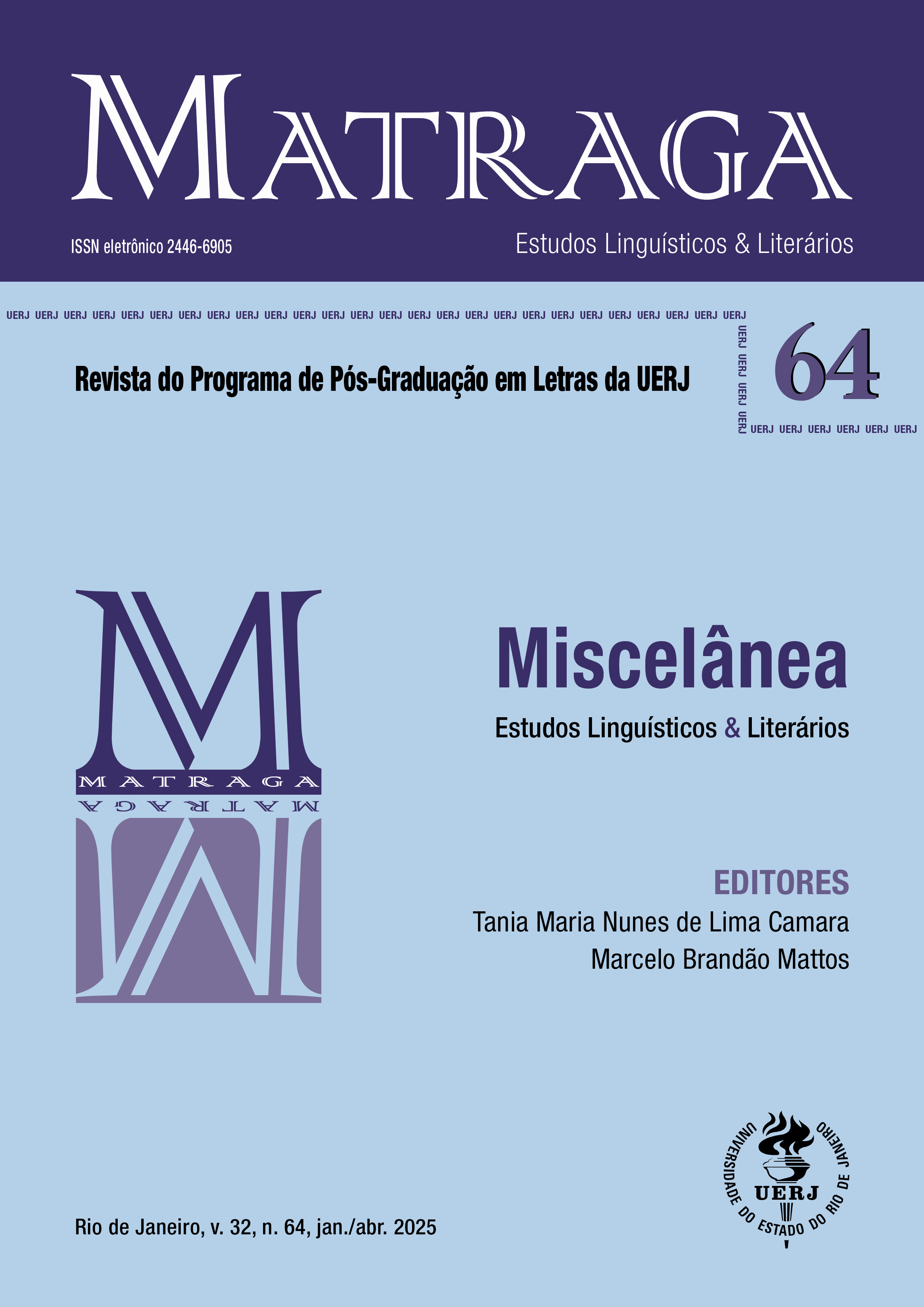The joy and the yoke in Falo (1976), by Paulo Augusto
DOI:
https://doi.org/10.12957/matraga.2025.85492Keywords:
Military Dictatorship, Authoritarianism, Homoeroticism, Paulo AugustoAbstract
Published in 1976, the book Falo, by Paulo Augusto, came to light at a time when Brazil was under the yoke of the Military Dictatorship (1964-1985) and brought, in its verses, themes considered pernicious in the eyes of the ruling morality of the country. In this article, we carry out an analytical-interpretative reading of poems with the objective of finding out how the Brazilian social, political and cultural conjuncture of the 1970s permeates the construction of the texts, underlining the friction between the mechanisms of oppression and control prevailing in the period and the elaboration of poetic subjectivities read as dissidents to the normative model of sexuality. The analysis of the selected poems starts from the understanding that relations between literary text and social life (Adorno, 2003; Candido, 2006; 2019) exist, formalized through aesthetic and compositional procedures decanted in the elaboration of the textual materiality. To carry out this investigation, we mobilized theoretical references that allow us to understand the sociopolitical (Schwarcz, 2019; Quinalha, 2021a; 2021b) and cultural (Alves, 2019; Ferraz, 2013) situation of the “years of lead.” Also contributing to our reflection are the dialogues with other readers of Augusto’s oeuvre, such as Mattoso (2003), Santos (2022) and Gomes Varjão (2019), and the research by Moraes (2008; 2021) on erotic literature. With the study of Paulo Augusto’s poems, we perceive the development of a poetic voice that, despite the moralistic regimes of continence, insists on proclaiming its desires, enjoying with body and soul in language, in a blatant way.
Downloads
References
ADORNO, Theodor. Palestra sobre lírica e sociedade. In: ADORNO, Theodor. Notas sobre Literatura I. São Paulo: Duas Cidades; Ed. 34, 2003. p. 65-89.
ALVES, Alexandre. Poesia Marginal da esquina atlântica: breve panorama da poesia marginal potiguar. 1. ed. Natal: Sol Negro Edições, 2019.
AUGUSTO, Paulo. Falo. Natal: Sebo Vermelho, 2003.
CANDIDO, Antonio. Estudo analítico do poema. São Paulo: Humanitas, 2006. CANDIDO, Antonio. Literatura e Sociedade. Rio de Janeiro: Ouro sobre Azul, 2019.
FERRAZ, Eucanaã (org.). Poesia marginal: palavra e livro. São Paulo: Instituto Moreira Salles, 2013.
GOMES VARJÃO, João Victtor. “Quer me tributar, me chupar, foder-me porque sabe que é maravilhoso ser fresco” – A poesia-bicha de Paulo Augusto. Revista Periódicus, Salvador, v. 1, n. 11, p. 192–208, 2019. Disponível em: <https://periodicos.ufba.br/index.php/revistaperiodicus/article/view/29300>. Acesso em: 27 jun. 2024.
JÚNIOR, Orison Marden Bandeira de Melo; PINHEIRO, Vanessa Neves Riambau. ‘Queer Africa’: a literatura como arte de resistência. Revista Letras Raras,Campina Grande, v. 11, n. 4, p. 135-159, dez. 2022. Disponível em: <https://revistas.editora.ufcg.edu.br/index.php/RLR/article/view/764>. Acesso em: 23 dez. 2024.
MATTOSO, Glauco. lira libertária. In: AUGUSTO, Paulo. Falo. Natal: Sebo Vermelho, 2003. p. 11-13.
MORAES, Eliane Robert. O corpo da língua: notas sobre a erótica literária brasileira. REVELL: Revista de Estudos Literários da UEMS, Campo Grande, v. 1, n. 28, p. 235-244, 2021. Disponível em: . Acesso em: 03 jun. 2023.
MORAES, Eliane Robert. Topografia do Risco: o erotismo literário no Brasil contemporâneo. Cadernos Pa- gu, Campinas, n. 31, p. 399-418, 2008. Disponível em: <https://www.scielo.br/j/cpa/a/QpH6nwzGCBGK6Fh- C9Dxzjdf/?format=pdf&lang=pt>. Acesso em: 03 jun. 2023.
QUINALHA, Renan. Contra a moral e os bons costumes: a ditadura e a repressão à comunidade LGBT. São Paulo: Companhia das Letras, 2021a.
QUINALHA, Renan. Lampião da esquina na mira da ditadura hetero-militar de 1964. Cadernos Pagu, Cam- pinas, n. 61, p. 1-17, 2021b. Disponível em: <https://periodicos.sbu.unicamp.br/ojs/index.php/cadpagu/arti- cle/view/8666868/27241>. Acesso em: 22 abr. 2023.
SANTOS, José Vinicius dos. “Vai, Paulo, ser gay na vida!”: a poesia homoerótica pioneira em Falo, de Paulo Augusto. Trabalho de Conclusão de Curso (Letras – Língua Portuguesa) - UFAL, Campus Arapiraca, Uni- dade Educacional ARAPIRACA, 2022. Disponível em: <https://ud10.arapiraca.ufal.br/repositorio/publica- coes/4269>. Acesso em: 03 jun. 2023.
SCHWARCZ, Lilia. Sobre o autoritarismo brasileiro. São Paulo: Companhia das Letras, 2019.
SILVA, Antônio de Pádua Dias da. A Literatura Gay. In: BONNICI, Thomas; ZOLIN, Lúcia Osana. Teoria Literária: abordagens históricas e tendências contemporâneas. Maringá: Eduem, 2019. p. 355-368.
SILVA, Cristiano Augusto da. Poesia de resistência, poesia engajada, poesia de testemunho. In: ALVES, I.; SIQUEIRA, J. S.; FIUZA, S. (org.). Poesia &...: teoria e prática do texto poético. Goiânia: Cegraf UFG, 2022.
p. 159-178.
TYSON, Lois. Lesbian, gay and queer criticism. In: TYSON, Lois. Critical theory today: A user-friendly gui- de. 2. ed. New York: Routledge, 2006. p. 317-358.
Downloads
Published
How to Cite
Issue
Section
License

This work is licensed under a Creative Commons Attribution-NonCommercial 4.0 International License.
Authorization
Matraga – Scientific Journal of the Post-graduate Program in Arts and Humanities of UERJ is authorized to publish the article submitted here, if it is accepted for online publication. It is attested that the contribution is original, that it is not being submitted to another publisher for publication, and that this statement is the expression of truth.
The works published in Matraga's virtual space – Scientific Journal of the Post-graduate Program in Arts and Humanities of UERJ will be automatically transferred, and your copyright is reserved to Matraga. Its reproduction, in whole or in part, is conditional on the citation of the authors and the data of the publication.

Matraga uses license Creative Commons - Attribution-Non-Commercial 4.0 International.





